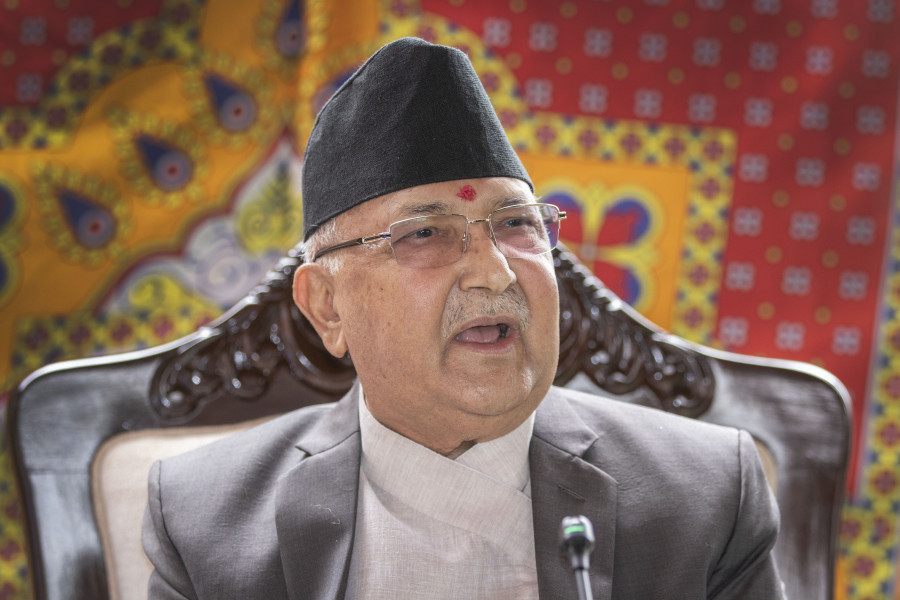Columns
Despite rhetoric of nationalism, Oli more dependent on foreign forces
When political leaders lack concrete ideology, they often take recourse to ideas of development and stability.
Ajaya Bhadra Khanal
After announcing elections for April 30 and May 10, Prime Minister KP Oli has launched a new political group. With looming uncertainty about the fate of his new initiative, Oli is already trying to balance nationalism with foreign relations in order to secure political leverage and deliver development.
It is difficult to predict how the prime minister’s new adventure will fare or whether he will lead a sustainable political force. However, there are several factors that could shape the political future of Oli’s new political group as well as the future of the country.
Oli’s immediate future politics depends on his opaque relations with foreign powers, Sher Bahadur Deuba and constitutional bodies as well as his ability to forge a new constituency. The long-term future, however, is uncertain.
Driven by ego
Oli’s new political platform has three fundamental pillars: nationalism, development, and personal ego.
His rationale for dissolving the House and forming a new party also focuses on his individual personality. Contrary to fact, he acts as if he was directly elected to the prime ministerial berth. As is well known, he cites obstruction of governance and the desire to prevent instability as key reasons for dissolving the House. But the next step in his logic is that, since nobody can now change the prime minister, Nepal is in a state of stability.
Oli is right in claiming that extremely unhealthy practices in the ruling party were causing political instability. But for him, instability is all about whether his opponents are able to remove him or not. It is never about the country or the constitution.
KP Oli is struggling to sell his personality as a leader of the communist movement to his potential constituents. After dissolving Parliament, he has been launching focused attacks against Pushpa Kamal Dahal and Madhav Kumar Nepal. He’s been using jokes and humour to belittle his political opponents. His speeches recently try to portray himself as a communist leader who has contributed more to Nepali politics than the other two leaders. He has also been flaunting the notion of seniority to convince his communist constituents.
While he blames Dahal and Nepal for their corruption and ambition, concerned solely about benefitting their family and friends, he portrays himself as working for the people. He appears to be going through a crisis regarding who his supporters are and who his party will represent.
In addition to the existing political elites, the intermediate class, left-leaning nationalists and beneficiaries at the constituency level are likely to be Oli’s new supporters. The political elites are those who are directly benefitting from the theft and extraction of state resources and abuse of power. The intermediate classes are the groups patronised by the political elites and those who enjoy the trickle-down of benefits and resources. It will be difficult for Oli to widen this group in the next several years, by which time other political parties may falter and lose their ideological and political identity.
Geopolitics and nationalism
Now that he has dissolved the House, Oli claims he will take responsibility for leading the nation and delivering development. The new political party and movement are all about Oli and his personality. The new party will be all about Oli and satisfying the needs of his ego. In this regard, other parties like Nepali Congress and Nepal Communist Party (NCP) are not really different.
Oli continues to pit himself against the ideas of regionalism and indigenous nationalism (jatiyata). He seeks to portray Nepal as a common garden, in much the same way the founder of modern Nepal, Prithvi Narayan Shah, did.
Prime Minister Oli is still intent on using nationalism and his stand against India as political tools. In his speeches, he makes frequent use of his stance against India, including issuing of a new map and expansion of border observation posts. Since nationalism is one of the few tools left to him he will continue to make use of them in public when the occasion arises.
When individuals aspiring to become political leaders lack ideology, constituents and political beliefs, they often take recourse to ideas of development, stability, and service to the people; Oli is one such person.
Another major factor is geopolitics, which is not going to go away from Nepali politics. In his several speeches in the last few weeks, Oli has been insisting, again and again, that the source of the current political instability is the ‘unhealthy’ relationship that Nepali political leaders have with foreign powers. He has cast the dissolution of the House as an attempt to stabilise the country by preventing domestic actors from becoming pawns at the hands of foreign forces. He has labelled Dahal and Nepal as corrupt traitors who work under the instruction of foreign powers.
Furthermore, his image as a successful leader depends on relations with India, China, and the United States. The most significant of his achievements are projects being developed with the assistance of India, China and international financial institutions. These include development works in the Mahakali region, railway agreements with China, and projects conducted through the assistance of the World Bank and Asian Development Bank. Therefore, foreign countries and institutions are key to his image. His dependence on foreign countries and institutions have grown.
Prime Minister Oli is still trying to sell the idea of nationalism and taking a stand against India. The difference between his hidden negotiations with India and China and his public postures are likely to cause a significant tectonic shock in the future.




 16.12°C Kathmandu
16.12°C Kathmandu.jpg)















